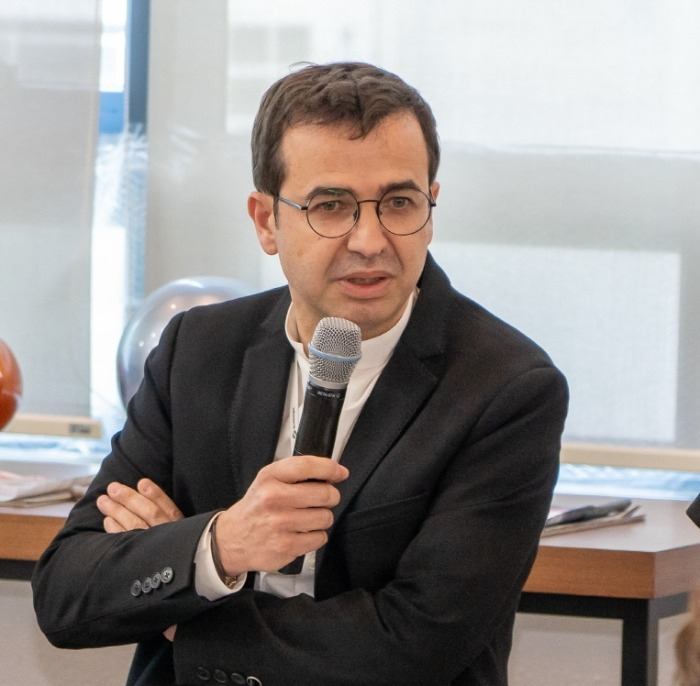Automobiles
Renault confident of Korean sales recovery; looks to larger cars
The carmaker, with Geely as the second-largest shareholder, will normalize its Busan plant and target 10% Korean market share
By Jun 13, 2022 (Gmt+09:00)
3
Min read
Most Read
LG Chem to sell water filter business to Glenwood PE for $692 million


Kyobo Life poised to buy Japan’s SBI Group-owned savings bank


KT&G eyes overseas M&A after rejecting activist fund's offer


StockX in merger talks with Naver’s online reseller Kream


Mirae Asset to be named Korea Post’s core real estate fund operator



When French carmaker Groupe Renault dropped Samsung from its South Korean unit's company name in March, it aroused worries that the firm may not be able to achieve successful growth in Korea with Renault’s brand power alone.
However, Renault Korea Motors Co. CEO Stéphane Deblaise is confident in the company's revival in the local market. The firm begins its journey in an unprecedentedly dynamic era with the new name, the CEO announced in March.
Renault Korea is now set to accelerate its further growth. At a press conference on June 10, Deblaise said the firm will step up manufacturing new cars and normalize operations of its Busan plant.
Inaugurated on March 1, the CEO has already dealt with some major changes in the Korean unit. The company name shifted from Renault Samsung Motors to Renault Korea Motors in mid-March, and China’s Zhejiang Geely Holding Group Co. acquired a 34.02% stake in the Korean unit last month.
Geely made the investment via the issuance of new shares for a capital increase, which resulted in a 30% rise in Renault Korea’s corporate value. As of June 2022, Geely is the second-largest shareholder of Renault Korea, following Renault’s French headquarters.
The CEO emphasized that Geely will “never” participate in the management of Renault Korea, and only the French headquarters and Renault Korea’s leadership will determine the Korean unit’s business plans. He added that Volvo Group and the Mercedes-Benz Group AG were successful without their stakeholder Geely being involved in the management.
Renault Korea is planning to design and produce a new model of finished cars based on Volvo’s compact modular architecture (CMA) platform at its Busan plant. Volvo’s platform will boost Renault Korea’s manufacturing of new cars to attract Korean consumers that generally prefer large cars to compact cars, he said. This will grow Renault Korea’s competitive edge over Hyundai Motor Co. and Kia Corp., the two automakers making up 70% of the local car market, he added.
Renault Korea targets producing 250,000 to 300,000 units of the new cars annually, including 150,000 units for the local market. The company is targeting 10% market share of the local market.
The first step of the project is normalizing its Busan plant. Renault Korea’s annual production capacity halved from 264,037 units in 2017 to 128,328 units in 2021, and it had an operating loss of 8 billion won ($6.2 million) last year.
A main reason for the slow production is that Japan’s Nissan Motor Co. reduced orders to assemble sports utility vehicle (SUV) Rogue in 2019 and ended the contract in the following year. As of 2018, Rogue accounted for 48% of the Busan plant’s yearly production.
Regarding future mobility, the CEO said Renault Korea is aiming to produce electric vehicles in 2026 when EVs will make up 20% of the local car market. The Korean unit is set to confirm the plan after reporting to the French headquarters' chairman. As it expects hybrid cars to be in high demand for years to come, Renault Korea will launch a hybrid model of SUV coupé XM3 this year and then prepare for EV production, he said. The company will change the existing production line of the Busan plant, rather than building new factories.
Renault entered the Korean car market in 2000 taking over Samsung Motors, which was suffering from soaring borrowing costs after the 1997-1998 Asian financial crisis. The French carmaker kept the Samsung trademark for brand awareness in Korea, but it didn’t extend the contract in August 2020 for Renault Samsung to use the Samsung brand. Before Geely acquired the shares, Samsung Card was the second-largest shareholder of Renault Korea.
Write to Hyung-Kyu Kim at khk@hankyung.com
Jihyun Kim edited this article.
More to Read
-
 Electric vehiclesHyundai, Kia speed up expansion in European EV market
Electric vehiclesHyundai, Kia speed up expansion in European EV marketMay 30, 2022 (Gmt+09:00)
2 Min read -

-
 AutomobilesRenault drops Samsung from brand name in Korea to end ties
AutomobilesRenault drops Samsung from brand name in Korea to end tiesMar 17, 2022 (Gmt+09:00)
2 Min read -
 AutomobilesRenault vows action if Korean unit fails to improve productivity, cut costs
AutomobilesRenault vows action if Korean unit fails to improve productivity, cut costsFeb 09, 2021 (Gmt+09:00)
3 Min read
Comment 0
LOG IN


